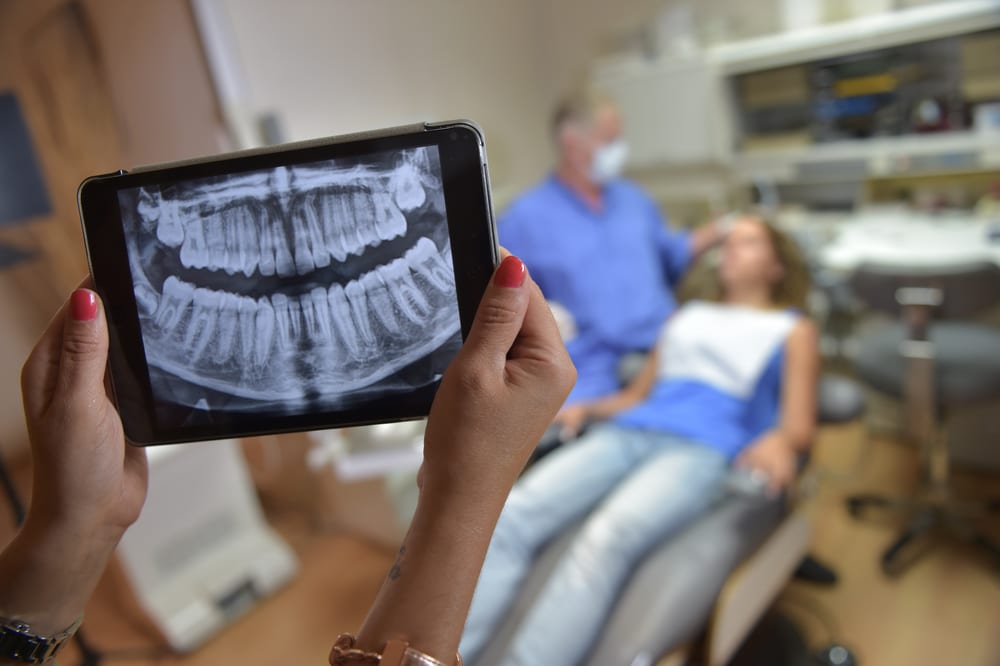Teeth grinding is a common problem, but getting orthodontic treatment like Line-M-Up™ or braces is still possible if you or your child suffer from bruxism!

Excessive teeth grinding is often referred by its technical name, bruxism, and millions of people with bruxism aren’t sure if orthodontic treatment is right for them or not.
Many people with bruxism aren’t sure if they’ll potentially grind down their invisible aligners, or if there are teeth grinding guards for braces patients. This type of information is sometimes difficult to narrow down for prospective patients with bruxism, so we’re providing a comprehensive guide oriented around the relationship between orthodontic treatment and teeth grinding.
What Are The Common Causes of Teeth Grinding?
There are two main types of bruxism that people experience: sleep bruxism and awake bruxism. When it comes to the causes of teeth grinding, dental experts believe the following are most common:
- Anxiety, stress, anger (emotions are often linked to awake bruxism)
- Genetics (often connected to sleep bruxism)
- Sleep disorders
- Certain types of medication
- Unhealthy substances (tobacco products, alcohol, caffeine, etc.)
- Health conditions (including ADHD, dementia, and Parkinson’s Disease)
- Bite problems and misaligned teeth
Common Complications Associated With Bruxism
Mild sleep bruxism and awake bruxism often don’t require extensive treatment, but chronic sleep bruxism absolutely should be treated by experienced dental specialists. This is largely because persistent sleep bruxism can cause the following:
- Chipped/fractured teeth
- Excessive enamel wearing
- Temporomandibular joint disorder (TMJ)
- Earaches/headaches
- Loose teeth
- Chewing pains
- Sleeping difficulties
A lot of people don’t even realize that they’re grinding their teeth while they sleep until someone mentions it to them, or if they start experiencing symptoms like facial muscle soreness.
Can You Wear Line-M-Up™ Invisible Aligners If You Grind Your Teeth?
Yes and no, most patients with bruxism can still get Line-M-Up™ aligners as their orthodontic treatment options; however, it’s important to remember that teeth grinding can cause aligner trays to wear down more quickly than they normally would and also cause back teeth to separate and not touch if you are clenching or bruxing. The good news is that Line-M-Up™ patients only wear aligner tray sets for a couple weeks at a time, so you’ll be onto your next trays by the time they may need to be replaced.
Also, if bruxism or clenching occurs at night we suggest wearing them during the day so that the intrusion of the back teeth does not occur. This may make the treatment take longer though as we would not be wearing them 22 hours a day.
Will Orthodontic Treatment Help People With Bruxism?
This largely depends on the underlying causes of an individual’s teeth grinding. Bruxism does happen to be much more prevalent amongst people with misaligned teeth, so properly adjusting your smile can many times help you avoid this type of behavior.
Many people with awake bruxism are more reminded of their teeth grinding habits while wearing invisible aligners, so in this way the aligners can help people break the habit.
It’s also important to remember that some people with severe bruxism will experience worse teeth grinding at the beginning of their treatment before it eventually gets much better. This is due to the mild sensitivity that’s common during the very initial stages of orthodontic treatment, but this sensitivity is many times another reminder to help people stop grinding their teeth as well.
Can Invisible Aligners Be A Good Night Guard Against Teeth Grinding?
There are several ways to address teeth grinding, and many people will use a night guard to better protect themselves while sleeping. This invaluable dental appliance can prevent jaw and teeth damages for countless people with bruxism.
The good news is that you can be confident in your aligners working as a night guard because both appliances have a similar design, and your aligners will provide that necessary cushioning between your lower and upper teeth.
Can Braces Patients Get A Special Teeth Grinding Guard?
Braces of course don’t cover up a patient’s entire arch like invisible aligners do, but braces patients will still be able to wear a night guard if they grind their teeth while sleeping.
One thing that needs to be taken into account is that braces patients will experience teeth shifting throughout their treatment process, so it’s likely that you’d need to change your boil-and-bite night guard a few times so it consistently fits properly. We’re always more than happy to provide custom orthodontic guards for our patients with bruxism, and what’s great is that these custom guards will allow for teeth movement so you don’t need to replace it during your treatment!
Reach Out To JK Orthodontics To Schedule In Initial Consultation With Dr. Karpac!
JK Orthodontics has supported many patients that experience persistent teeth grinding, and our treatment options are accommodating for this type of dental condition.
Contact us online or call us at 614-766-0330 (Dublin office) or 614-471-6355 (Gahanna office) to speak with our team today about how Dr. Karpac can help perfect you or your child’s smile while simultaneously accommodating for teeth grinding!

